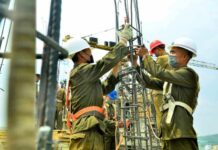North Korea’s recent enactment of a law to enforce use of the Pyongyang dialect of Korean is leading many young people in the country to choose their words carefully to avoid punishment, Daily NK has learned.
A Daily NK source in Pyongyang said Monday that the “Pyongyang Cultural Language Protection Act designates Pyongyang’s manner of speaking as the basic cultural language [“cultural language” is the official name of North Korea’s dialect of Korean], and strictly bans the use of incomprehensible local dialects, foreign-derived words and South Korean speech instead of our unique language.” The source pointed out, however, that many “people don’t really think the law has much impact on their day-to-day lives.”
By enacting the law, North Korea has moved to ban the use of regional dialects, South Korean speech and words borrowed from foreign languages, and is encouraging people to use the standard Pyongyang dialect. Most people, however, don’t think the law will have much impact, based on the source’s report.
People are unlikely to accept being told to use Pyongyang speech when every region has their own dialect that has been used for a long time, the source said.
This suggests that despite North Korea’s recent legislation aimed at stopping people from using regional speech, the country’s authorities may not be able to completely eliminate deep-rooted regional dialects.
YOUNG PEOPLE BECOME MORE CAREFUL ABOUT WHAT THEY SAY
Regardless of the law’s impact on the general population, it is clear that North Korea is using it to tighten crackdowns on young people using South Korean speech. Young people are having to heavily police how they use their own language in order to avoid being caught up in government efforts to eliminate wayward speech.
The source said the authorities have long been using task forces aimed at eliminating anti-socialist and non-socialist behavior to punish young people who use foreign words or South Korean speech.
“The enactment of the Pyongyang Cultural Language Protection Act expressed once again the government’s intention to use legal means to eliminate young people’s use of foreign words or South Korean speech,” he said.
In the past, enforcers would sometimes let people go in return for bribes, but now “young people have to be careful about what they say because they will be punished in accordance with the law,” the source added.
North Korea has long cracked down on the use of South Korean speech, regarding it as anti-socialist or non-socialist behavior, but some people were able to avoid punishment by bribing enforcers tasked with cracking down on such behavior.
The source’s report suggests, however, that with the recent enactment of the Pyongyang Cultural Language Protection Act, violators are unlikely to escape punishment even if they pay a bribe.
In fact, Socialist Patriotic Youth League organizations are telling members to “immediately report people who use foreign words or South Korean speech to the police or security agencies when you find them,” the source said.
Meanwhile, North Korea is stepping up efforts to indoctrinate its citizens about the necessity of using the standard Pyongyang dialect through broadcasts and lectures.
On TV, the authorities are using news and film slots to educate viewers on the Pyongyang dialect. In general, this media calls on people to voluntarily adhere to the Pyongyang Cultural Language Protection Act and love and cherish Pyongyang speech.
“Some Workers’ Party and labor group organizations are instructing its members to hold lectures aimed at explaining the Pyongyang Cultural Language Protection Act,” he said.
Translated by David Black. Edited by Robert Lauler.
Please direct any comments or questions about this article to dailynkenglish@uni-media.net.


















